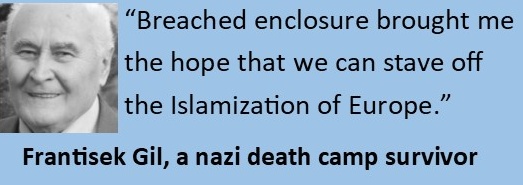(beginning of the article is here)
Textbooks speak of Hussite religious enthusiasm and fanaticism, which is true. But history is full of religious zealots who were burned by the hundreds. The difference was the brilliant warrior Jan Žižka of Trocnov – a military professional who became the supreme military commander of the Hussites at the age of more than 60.
He solved a hopeless problem. The Hussite nobility had only small troops, so on one side were peasants with no training, on the other side the best military professionals of Europe at the time, the most advanced technology (iron cavalry), and even more, numerical superiority.
The Hussite nobility had only small troops, so on one side were peasants with no training, on the other side the best military professionals of Europe…
How to deal with such a matter? The most common approach is to look at what the success of the other side is based on and emulate it. For Žižka, this would have meant staring in fascination at the Iron Knights. A mass capable of crushing anything in its path. Warriors in armour worth many times the lifetime wage of a working man. Horses specially bred for such purposes. Warriors trained from childhood. If Žižka had gone this way, he would have put peasants on horses, had some kind of armour made for them… and sent them to certain slaughter. They’d never be able to catch up on their training, they wouldn’t be able to make up for years of practice, their equipment wouldn’t be as good.
Žižka looked at the invincible armies he knew well as a seasoned warrior with a different question. After all, they too must have some weaknesses.
Žižka looked at the invincible armies he knew well as a seasoned warrior with a different question. After all, they too must have some weaknesses. What are their weaknesses?
And the Iron Cavalry did indeed have a number of weaknesses.
- The heavy cavalrymen found it very difficult to move in difficult terrain.
- They had very limited ability to maneuver. Once the mass got moving, it was very difficult to stop or change direction.
- The Iron Knights were undisciplined. Each knight was essentially an independent warrior, and his behavior was consistent with that.
- They didn’t like to innovate. The way they fought was a matter of knightly honor. Every detail had meaning, even spiritual and symbolic meaning. To change something just because it was more effective – that was not for medieval knights.
There were many more weaknesses. There were enough to base a different type of army on. Žižka chose places with difficult terrain for encounters, or the engineer units made it worse in advance – sometimes digging pits, sometimes scattering iron hooks (making it difficult for horses to move) or setting other traps. And there were two major technical innovations.Wrought-iron farm wagons that could stop iron cavalry. And small firearms. Suddenly, the situation changed so that a village girl was able to shoot a warrior who had trained all his life off his horse.
And small firearms. Suddenly, the situation changed so that a village girl was able to shoot a warrior who had trained all his life off his horse.
Religious and nationalistic fervor, of course, played a role. But it is enough to remember that wars against heretics were then fought in an exterminationist manner. There was no more slavery, no more prisoners taken. The heretic population of conquered territories was seen as the spreaders of the plague. Kill every last baby and burn it! So the motivation of the defenders would have been sufficient even without religion. However, Žižka added to this strict discipline (often very harshly enforced), and also education. One of the participants in the Crusades, the later Pope Pius II, stated in his notes that Czech village women knew the Bible better than the bishops of Rome. This educational superiority also applied to technology.
If we were to apply Žižka’s experience to nationalist movements today, it would be as follows.
It is hopeless to try to imitate the strategy of the other side.If they have succeeded in their long march through the institutions, we will make our own long march through the institutions. If they have liberal movie stars, we’ll make conservative movie stars.That’s basically what Andrew Breitbart and others are suggesting. But it’s never going to work. They’re better at it, they have the resources, they have the experience. We can’t win in their field with their guns.
If they have liberal movie stars, we’ll make conservative movie stars. But it’s never going to work.
Second. You can’t apply the strategy of the 19th century labor movement. We can admire those people, but today it would be waging the last war.
We need a modern solution in the sense that it is completely new. And it has to be one that the other side can’t imitate. That is, the weakness must come from the way it maintains its power. That’s going to take a lot of analytical work, including testing theories on data. Economic analysis, sociological analysis, mathematical modelling, etc. It’s a huge learning task. It may be of some advantage that the results of all the scientific research done in the last decade are available on the internet.The hard part is finding the important stuff in the huge amount of ballast. The more educated part of the resistance movement has a huge job ahead of it, and we will also have to study an awful lot.
If we don’t feel like it, there is the second Czech experience. Towards the end of the 17th century, the landlords drove the Czech peasants to the brink of starvation, and the peasants remembered their Hussite ancestors. The clash with the regular army lasted less than an hour. The state authorities did not bother to pursue those peasants who survived. There was no need.


